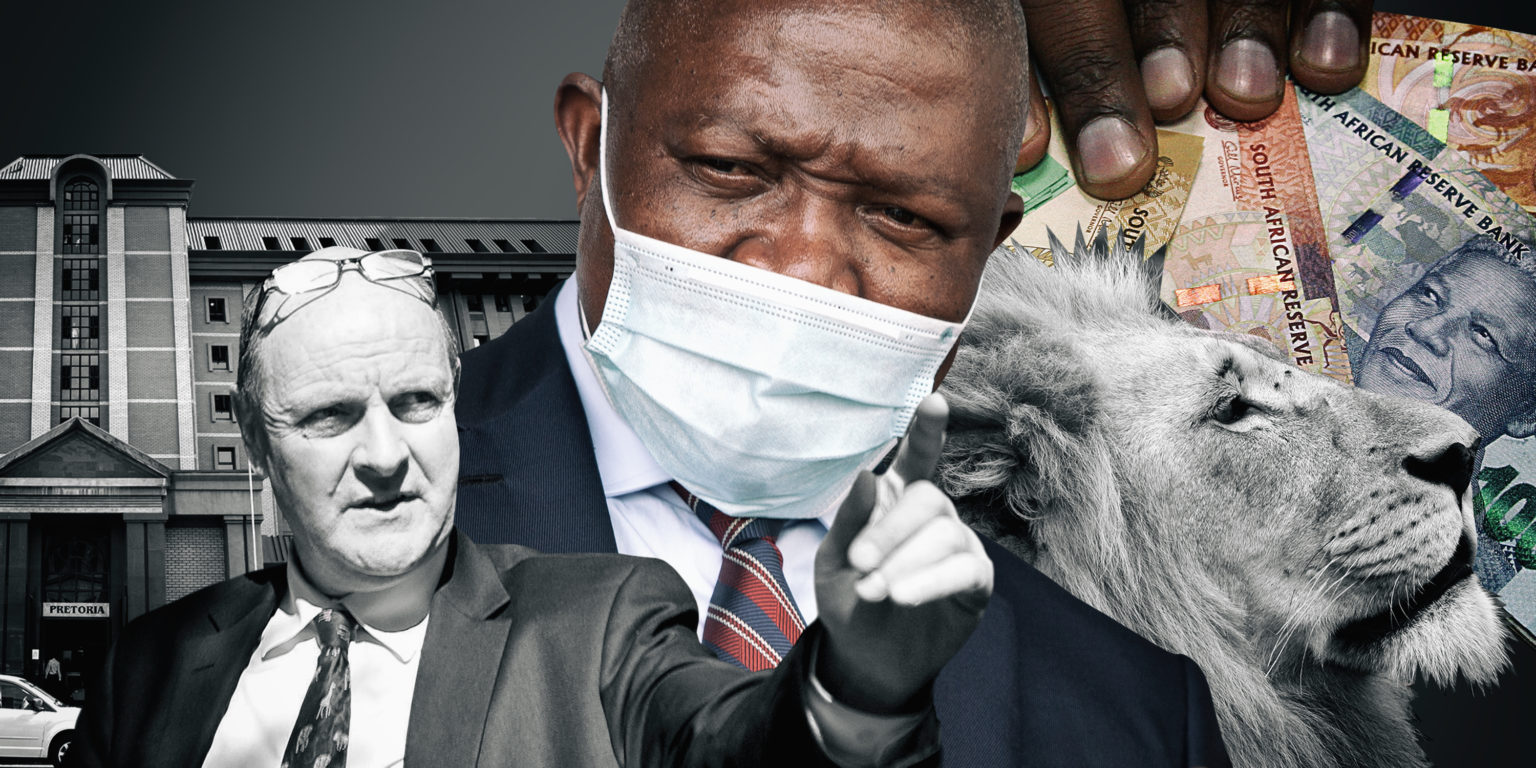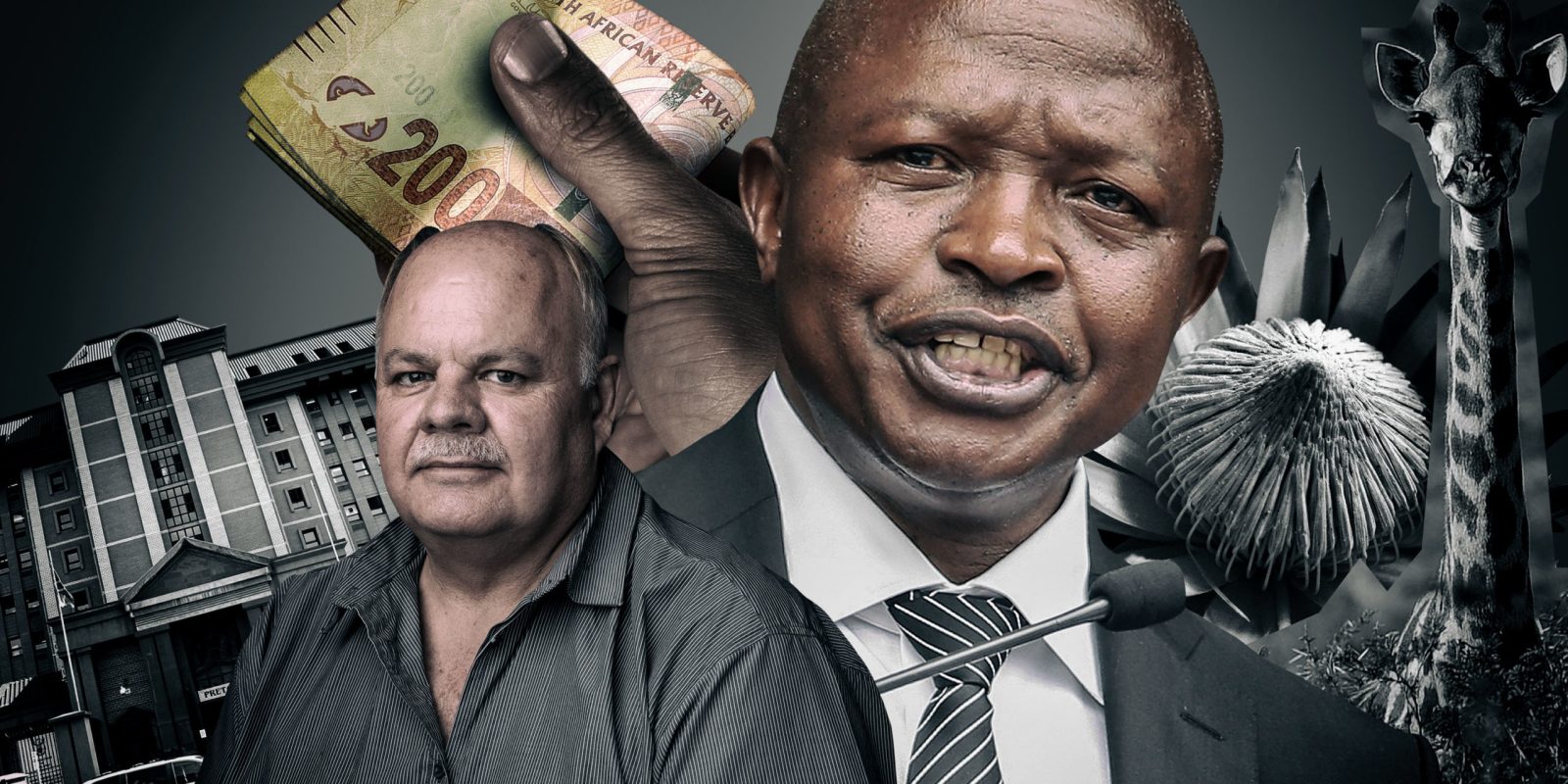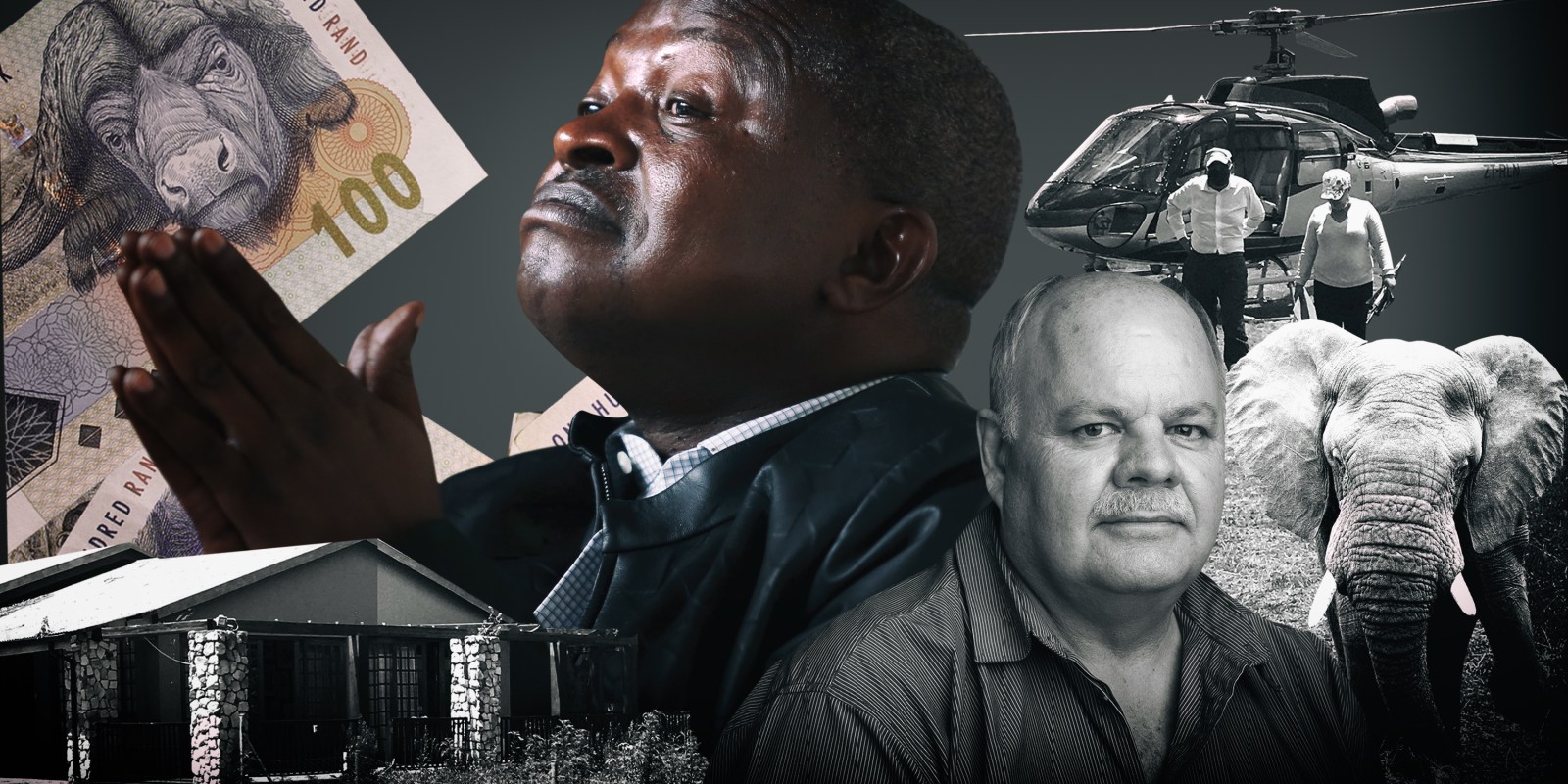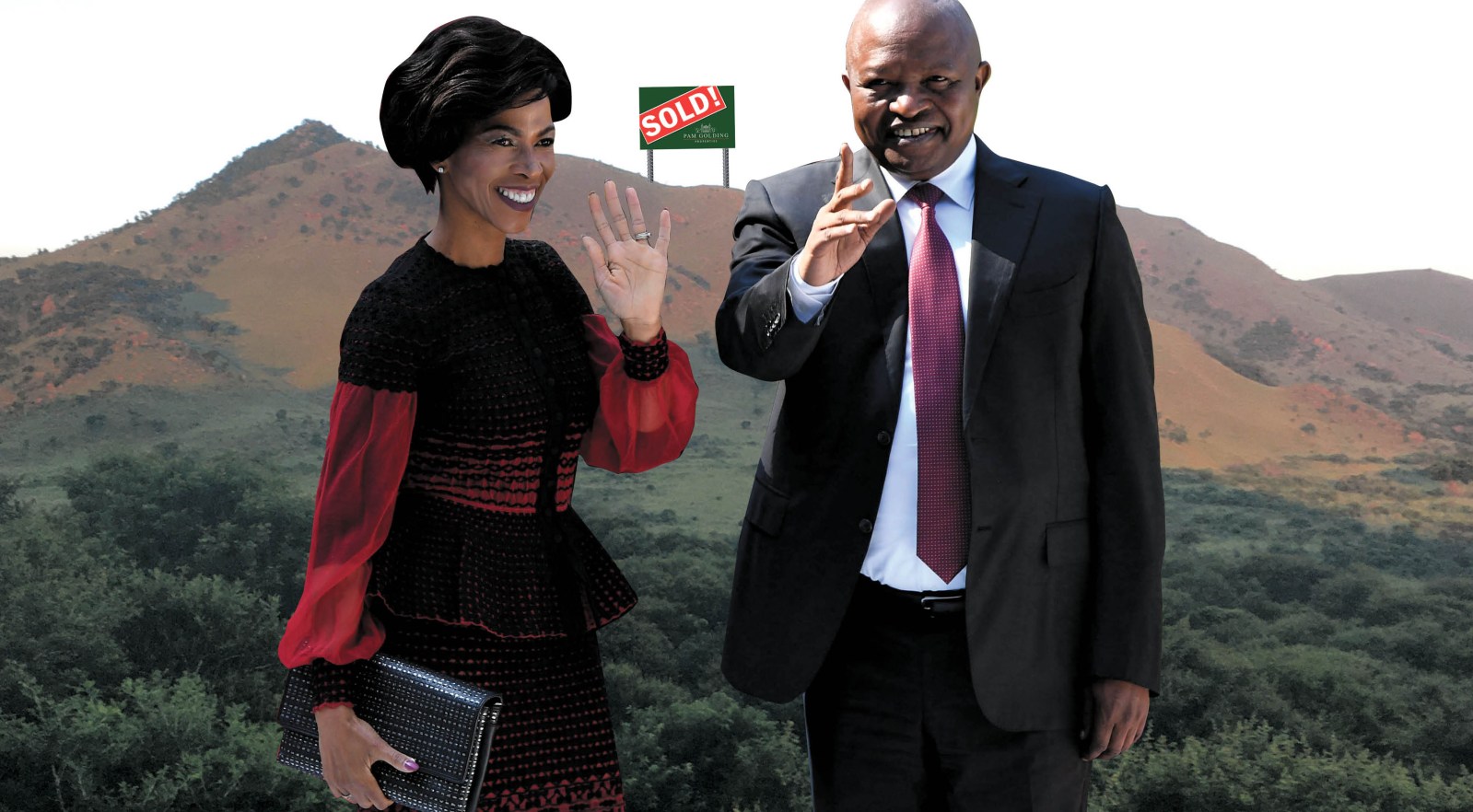By Kevin Bloom• 19 August 2021

Illustrative image | Sources: Paul O' Sullivan. (Photo: Gallo Images / Foto24 / Lauren Mulligan) | Deputy President David Mabuza. (Photo: Gallo Images / Misha Jordaan) | EPA / GERNOT HENSEL | Nadine Hutton / Bloomberg via Getty Images| Ashraf Hendricks / GroundUp.
The first three days of the high court showdown between conservationist Fred Daniel and Deputy President David Mabuza have been marred by a series of avoidable delays. Daily Maverick has obtained access to court documents that suggest these delays are all part of a much broader strategy – employed by former president Jacob Zuma in the Arms Deal corruption saga, the strategy has recently achieved local fame as the ‘Stalingrad defence’.
Note: The documentary evidence used for the reporting of this article has been accessed on CaseLines, the new online system employed by South African courts. Access to CaseLines was secured on the opening day of the trial by Daily Maverick’s attorney
I.
“This is an astonishing document,” said Advocate Owen Cook, “the defendants now wanting to introduce two further special pleas, the one is a plea to the jurisdiction of the court to determine this matter.”
It was about 20 minutes into the pre-trial conference of 12 July 2021, and Cook was addressing Judge Cassim Sardiwalla of the North Gauteng High Court, who had been handed the unenviable task of presiding over the R1-billion civil suit that conservationist Fred Daniel had brought against the Mpumalanga Tourism and Parks Agency and a host of government entities.
“Judge, you know well that a plea to the court’s jurisdiction is something which is required to be raised in the initio vetus, not ten years, eleven years after the action is instituted.”
Owen’s point, given that the special plea had been filed on 4 July 2021, two weeks and one day before the matter was due to go to trial, was that tactics like this had been employed by the defendants since July 2010, when case number 34502/2010 first appeared on the court roll. For nearly ten minutes already, he had been laying down a brief history of such tactics, which had culminated in Daniel seeking “some kind of judicial intervention” and applying for case management in 2018.
But, as Daily Maverick reported in March this year, not even case management — defined in the legal dictionary as a “proactive approach” that aims to sidestep the combative and drawn-out process of litigation — appeared to be working. As one example, on 15 May 2020, six weeks before the last trial date had been set, the first, fourth and seventh defendants had served a 108-page “request for further particulars” on the plaintiffs, which had come with the threat of a punitive cost order.
While Owen had referred to that request in the pre-trial meeting of 12 July 2021, he wasn’t the only member of Daniel’s legal team to allege that the defendants were playing an “obstructionist” game. In November 2020, Daily Maverick was sent a memorandum in which Advocate Jacques Joubert went straight for the jugular — the memo, which ran to dozens of points over six pages, asserted that Deputy President David Mabuza was “abusing his position of power” to deny the plaintiffs their section 34 right to a fair public hearing.
To be sure, as the first three parts of our “Dead Matter” series pointed out, there were a number of very good reasons that the long-delayed civil matter was being punted by the media as a David-and-Goliath battle between Daniel and the deputy president. As far back as 2003, when he was still buying up farm plots in fulfilment of his vision to regenerate one of the most threatened biomes on Earth — a vision, we noted, that for a time had become a reality under the name of “Nkomazi Wilderness” — Daniel had been blowing the whistle on the alleged land claims scam run by the Mpumalanga provincial government.
And Mabuza, when he took over as MEC for agriculture and land affairs in 2008, had reportedly taken the scam to a whole new level — so much so that in 2017 forensic investigator Paul O’Sullivan would open a case of fraud against the future deputy president, arguing on his website that “pretty much all the land restitution claims in Mpumalanga” during Mabuza’s tenure as MEC were false.
For his troubles, even after he had been forced to sell his 39,000-hectare private reserve — and forego the backing of Sol Kerzner’s One & Only Group, which had bought into the vision of expanding Nkomazi Wilderness into Africa’s seventh trans-frontier park — Daniel would face down harassment, arson, smear campaigns and death threats. He would become convinced that Mabuza was behind many of the attacks, pointing to a phone call (for which he held the cellular records) where the ANC heavyweight had allegedly persuaded him to accept the “false land claims” on Nkomazi, failing which “[his] safety could not be guaranteed”.
Mabuza, for his part, would deny these accusations.
“[Daniel] is a businessman who allegedly invested millions in developing the Nkomazi project,” Mabuza would testify in March 2011, in the only affidavit that he would ever submit to the North Gauteng High Court. “His main concern centres around the ‘land claims issue’. That issue was fully investigated and reported on. It was also fully ventilated in the Land Claims Court.”
But there had been no “full investigation” of the issue that Daily Maverick could locate, other than the forensic audits conducted by Ernst & Young, Derrick Griffiths of the Institute of Valuers and O’Sullivan, which had all concluded that the land claims scam was real. Neither could Daily Maverick find any evidence that the Land Claims Court had ventilated the matter.
By all accounts, case number 34502/2010 would be the first time that senior politicians would have to answer for the scam, which was why, presumably, the counsel for the defendants would continue to ignore the directives of the court.
II.
According to the South African advocate Anton Katz, the first recorded use of the term “Stalingrad legal defence” — otherwise known as the “Stalingrad strategy” — was in a judgment handed down by a United States district court in 1981. In it, the judge had criticised the defendants’ tactics, which, he wrote, “intended to exhaust the opposition and their more limited resources, in turn leading to acceptance of a modest settlement offer.” The historical analogy, as the judge had pointed out, was to the Battle of Stalingrad of World War 2, when the Soviets had defended their city from the Nazis over an intense five-month period of street-by-street attrition.
In the two-paragraph Wikipedia entry for the Stalingrad legal defence, the example of former South African president Jacob Zuma — specifically, his attempt to “avoid giving testimony before the Zondo Commission into state corruption” — takes up the entire second paragraph.
By some typically South African twist of fate, the date of 19 July 2021, when case number 34502/2010 was supposed to go to trial in the North Gauteng High Court, was also the date that former president Zuma appeared by video link from prison to request a further delay to his corruption trial — a set of circumstances and allegations that stretched back to the late 1990s, when Zuma reportedly received kickbacks for his role in the $2-billion arms deal.
“This application is Stalingrad season 27,” advocate for the state Wim Trengove told the presiding judge, referring to Zuma’s favourite legal strategy.
At almost exactly the same time, out in the virtual hinterlands of the North Gauteng High Court, where the spectre of Deputy President Mabuza loomed large over proceedings, Judge Sardiwalla was expressing the frustrations of the bench.
“This matter [has been going on] for years,” he said, “and I think there are parties, I hope I am entirely wrong, there are parties that want this matter to run for another ten years.”
It was the strongest statement yet from the judiciary that further delays would not be tolerated. Without naming names, Sardiwalla admonished the advocates and attorneys for ignoring his directive to enter into negotiations, issued in the pre-trial conference of 12 July. The minutes from the meetings he had ordered went “nowhere”, he said, because they focused on the “skimpy” issues instead of the “core” of the dispute. Sardiwalla now demanded to know what the real points of departure were — he had chatted with the judge president, he stated, and on the following item of contention they were both in agreement:
“This story about postponing and wanting the matter to run to next year is out of the question. So, whoever has suggested [it], forget it.”
The previous day, acting on behalf of Daniel, Advocate Joubert had sent a written submission to Judge Sardiwalla, summarising what he would present on 19 July. Near the top of the 38-point document, Joubert noted that the minutes of a meeting held between the parties on 13 July showed that the state attorney had not communicated the judge’s directives to his clients.
“The eleventh plaintiff [Daniel] has grave concerns about the failure of the state attorney to put the judicial directive of settlement negotiations into effect by not even communicating it to his clients,” Joubert wrote.
“My client has for years now made every attempt to mitigate his damages by entering into bona fide settlement negotiations with the defendants.”
Joubert then noted that Daniel’s attempts to mitigate his costs were first “used against him” in 2009, when a “fictitious special plea” had been created, which contended that the case had already been settled. “The evidence of former senior employees and consultants of the first defendant [the Mpumalanga Tourism and Parks Agency] confirm the fictitious nature of the special plea,” Joubert wrote.
“The eleventh plaintiff has estimated that it has cost in excess of R1.5-million to bring his legal team up to speed in the face of bare denials and an array of other special pleas on the eve of the 39-day High Court trial,” he continued. “The latest being the absurd special pleas of lis pendens and the lack of jurisdiction, eleven years after summons was issued.”
At which point, Joubert returned to the matter at hand, reminding the judge that the refusal of the defendants to even “attempt” to enter into bona fide negotiations was a violation of section 7(2) of the Constitution, where the South African state was obliged to “respect, promote and fulfil all the rights of the plaintiffs [in terms of] the Bill of Rights”.
Before adding that the conduct of the government defendants was therefore untenable, “especially in a country in the grip of a pandemic, ecological crisis and social upheaval”, Joubert echoed what Advocate Trengove would allege in the lead-up to the Zuma corruption trial the following day:
“The refusal to enter into bona fide settlement negotiations is a key component of the Stalingrad litigation strategy. The aim is to outlitigate self-funded plaintiffs by denying them their rights under section 34 to be heard by a court of law.”
In the event, when Joubert made his submissions directly to the judge via video link on 19 July, he was shot down by Advocate Mike Hellens, who had been retained to represent Deputy President Mabuza in his personal capacity. As Daily Maverick pointed out in the third part of our “Dead Matter” series, there were two things that everybody in the virtual courtroom would have known: first, although Mabuza was referred to by Hellens as the seventh defendant, this wasn’t technically the case (the seventh defendant had been listed in the court papers as the Mpumalanga MEC for agriculture and land affairs, a position Mabuza had last held in 2009); second, in another typically South African twist of fate, Hellens had made a national name for himself by acting for former president Zuma in the arms deal corruption saga.
So, again, at the same moment that Advocate Trengove was attempting to bring that matter to trial in the Pietermaritzburg High Court, Advocate Hellens was attempting to ensure that his current client would not be compelled to admit liability in the North Gauteng (Pretoria) High Court.
“Judge,” he said, “I took instructions while we stood down; the seventh defendant is unwilling to meet personally with anybody… the issues have been narrowed as far as they can be narrowed, and this is litigation not mediation. We do not need people to sit around a table and talk to each other… There is not going to be a settlement in this matter.”
When Joubert interjected that Judge Sardiwalla had ordered the parties to “talk about their risks in regard to liability” — and not, he made clear, for anyone to “admit liability” — Hellens dug in further.
“This is litigation. I am not going to expose my client to a one-on-one debate with Mr Daniel or anybody else [with regards to] the uninformed risk of my client about where they are going in the matter. We are in the High Court of South Africa, not in mediation.”
III.
By now, to anyone familiar with the murky and somewhat Shakespearean details of the case, everything was going according to script. As the official court transcription of 19 July showed, the actors were all playing their parts, with counsel for the plaintiffs attempting to move the matter forward and counsel for the defendants refusing to budge. Near the end of the virtual meeting — which, to reiterate, was supposed to be the start date of the trial — Advocate Andre Ferreira, representing the Mpumalanga Tourism and Parks Agency, the Mpumalanga Regional Land Claims Commissioner and another four government defendants, summed up the position of his team.
“Well, judge, we have been through this,” he said. “The allegations against the defendants who we represent, obviously also the deputy president, are so far-reaching, it includes collusive, fraudulent, unlawful, corrupt concoction in order to get Mr Daniel away from his land. Now that is, you know, very serious allegations to make. So now our client must, in the face of those allegations, say okay, we will settle with you, and we will pay you X amount of money. They will never do that, because the allegations are so far-reaching and, in our view, not credible.”
While all of this was old hat, what was new — after more than a decade of litigation, with Daniel’s combined legal fees now upwards of R20-million and counsel for the defence drawing at least the same (if not more) from state coffers — was the position of the judiciary.
“Well, I have heard you repeating yourself,” said Judge Sardiwalla. “I hear you and your client’s mandate is very clear as far as you are concerned… [But] I am directing that you will, or you must engage in a constructive, realistic pre-trial conference to reduce the duration of this trial and to narrow the issues as best as you can; not what you sent me as a pre-trial minute. I am not prepared to accept that. It does not deal with 90 percent of the aspects that need to be dealt with.”
The final date that the judge gave for the implementation of his directive was Thursday 29 July, with a “meaningful” pre-trial conference to be held before the deadline. Over three days from 26 July to 28 July, the parties would make a show of carrying out the judge’s orders — although, if the transcripts were any indication, it was clear that the focus was still on what Judge Sardiwalla had called the “skimpy” issues.
On 26 July, much of the day was taken up by the complaint of Hellens that the plaintiffs were leaking information to the press, who, he said, were providing a “distorted version of what happens in these case management meetings”.
On 27 July, the highlight was a lengthy argument between Hellens and Joubert, with the former insisting that the judge should not have been provided with a list of questions for the defendants that included hyperlinks to evidence.
“You have done hyperlinks to evidence,” said Hellens, “to which the judge as a case manager should not be exposed and potentially disqualifies him from sitting as the judge. May I ask in small letters, how dare you do that?”
Joubert, for his part, was resolute.
“Mike, I am not going to be engaging in a debate about the law at this moment in time. I do not think it is worth doing. I do not agree with what you are saying.”
And then, on the morning of 28 July, just as proceedings had kicked off, Joubert once again went for the jugular. As was customary at the start of the day, all the parties introduced themselves, with Hellens stating that he was “for the seventh defendant”.
Said Joubert: “Thank you, Mike. Mike, I just want to ask you that, I think at one of the meetings earlier you said you were still acting for the deputy president. Is that correct or not?”
Hellens: “I am acting for the seventh defendant.”
Joubert: “So not for the deputy president?”
Hellens: “The deputy president is no longer a defendant.”
Joubert: “No, I just wanted clarity on that. Thank you for clarifying that. So…”
Hellens: “In so far as he is implicated in any wrongdoing by way of allegations made against him, obviously I act for him. But he is not a defendant any longer. You removed him as a defendant…”
Joubert: “Ja, but your, the reason for you being here is that you are representing the seventh defendant. Not…”
Hellens: “In whatever guise you are raising the seventh defendant’s conduct.”
Joubert: “Okay. Thank you very much for clarifying that.”
Of course, the point of Joubert’s line of questioning was that there was still no clarity on the issue. And neither would there be any further clarity on the judge’s broad directive. On 29 July 2021, Joubert opened with the observation that there had been general “obstructiveness and evasiveness” over the previous three days, with counsel for the defendants answering only 10 of the 55 questions put to them.
As for the threat of Hellens that he would seek the judge’s recusal, Judge Sardiwalla asked for the objection to be put to him directly — but Hellens, when challenged, backed off. The judge, as all the parties were by now well aware, was determined that the matter would settle or run.
IV.
On 5 August 2021, under the header “That Cat has landed,” TimesLive announced that Deputy President Mabuza had returned to the country the previous day. Since 26 June he had been in Russia, undergoing medical treatment for an alleged “poisoning” that he had sustained while he was still the premier of Mpumalanga province. In Mabuza’s absence, South Africa had descended into its most violent period of civil unrest in almost three decades — the deputy president, in the face of compelling evidence that the unrest had been planned by a renegade faction of the ANC, had nothing to say.
Two days before he landed, however, on 2 August 2021, a letter from the office of the state attorney indicated that Mabuza’s name had been removed from the witness list.
What this meant for Advocate Hellens, who for months had been earning senior counsel fees at the South African taxpayers’ expense, was anyone’s guess. As the days wore on, there was no indication from Hellens that he was standing down.
The date that the trial was now supposed to kick off was 10 August, with the parties instructed to submit their final documents and prepare. But as the date approached, the defendants sprung more special pleas on the plaintiffs. The judge, it appeared, would now have to make a critical decision: would the special pleas be heard separately or as part of the trial?
In the event, Judge Sardiwalla decided to go with the latter. Eleven years and one month since the matter had been lodged in the North Gauteng High Court, the trial would finally begin — virtually, via Microsoft Teams — on Tuesday 17 August.
Still, although simply getting here was a massive victory for Daniel, the delays continued to play into the hands of the defendants. In any other trial of this nature, proceedings would normally begin with the opening statements of the parties. But because the plaintiffs were now juggling the diaries of their expert witnesses, they made the call to open with the testimony of their strongest witness, forensic investigator O’Sullivan.
As Daily Maverick reported on 18 August, O’Sullivan was supposed to give testimony on two issues, the Problem Animal Fund and the alleged land claims scam. Given that hours had already been lost on the complaints of the defendants’ counsel that they were experiencing technical difficulties, the witness could only get through a small portion of the first item before he had to leave for a prior engagement. With the rest of the afternoon sacrificed to the so-called technical glitches, Joubert would provide his opening statement the following morning.
“The plaintiffs’ case,” he began, at around 11am on 18 August, “is that their ecological project to create employment and an international tourist and educational destination to a UNESCO World Transfrontier Heritage Site, was sabotaged by the defendants.”
These defendants, he added, were “actuated by malice” and “acted with the sole and dominant purpose to inflict harm on the plaintiffs.”
Joubert then stated: “Their conduct included the gazetting of unvetted and unverified land claims on [Nkomazi Wilderness] and withholding valuable authorisation for the reserve to become a Big 5 destination.”
About fifteen minutes into his opening statement, Joubert then arrived at the identities and current statuses of the various defendants, pausing for effect on the seventh defendant, the MEC for land affairs and agriculture of Mpumalanga province.
“This is what one would call a ‘hot potato issue’,” Joubert said. “At the time, our current deputy president was the MEC… [but] at the moment, there is another incumbent. There’s some uncertainty in the plaintiffs’ minds as to whom Mr Hellens is actually representing… some clarity as we go on with this trial would be important for the plaintiffs.”
The same clarity, of course, would be equally important for members of the South African public. On the morning of 19 August, as Kobus Vermeulen, a former detective with the Badplaas branch of the South African Police Service, was in the middle of providing testimony on the alleged land claims scam, Hellens stalled proceedings with an objection.
It appeared for a brief moment that the judge had satisfactorily dealt with the objection, and that Vermeulen’s testimony would continue. But once again, Advocate Ferreira complained that he was experiencing technical difficulties.
The judge instructed counsel for the defence to take the rest of the day off, so that they could sort out their technical challenges once and for all.
It is expected that Vermeulen will take the stand again on the morning of 20 August. DM/OBP













